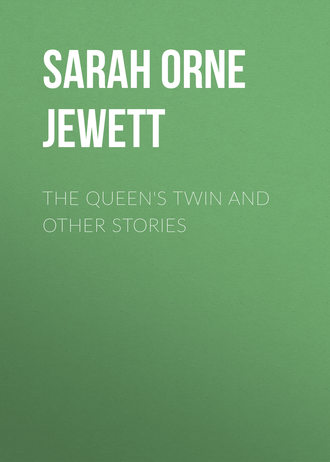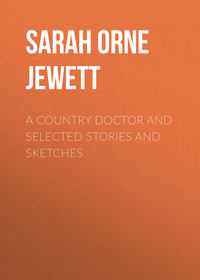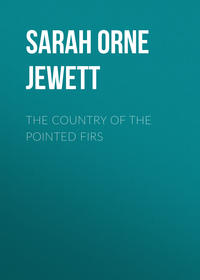 полная версия
полная версияThe Queen's Twin and Other Stories
II
One seldom gave way to a cruel impulse to look at an ancient seafaring William, but one felt as if he were a growing boy; I only hope that he felt much the same about me. He did not wear the fishing clothes that belonged to his sea-going life, but a strangely shaped old suit of tea-colored linen garments that might have been brought home years ago from Canton or Bombay. William had a peculiar way of giving silent assent when one spoke, but of answering your unspoken thoughts as if they reached him better than words. "I find them very easy," he said, frankly referring to the clothes. "Father had them in his old sea-chest."
The antique fashion, a quaint touch of foreign grace and even imagination about the cut were very pleasing; if ever Mr. William Blackett had faintly resembled an old beau, it was upon that day. He now appeared to feel as if everything had been explained between us, as if everything were quite understood; and we drove for some distance without finding it necessary to speak again about anything. At last, when it must have been a little past nine o'clock, he stopped the horse beside a small farmhouse, and nodded when I asked if I should get down from the wagon. "You can steer about northeast right across the pasture," he said, looking from under the eaves of his hat with an expectant smile. "I always leave the team here."
I helped to unfasten the harness, and William led the horse away to the barn. It was a poor-looking little place, and a forlorn woman looked at us through the window before she appeared at the door. I told her that Mr. Blackett and I came up from the Landing to go fishing. "He keeps a-comin', don't he?" she answered, with a funny little laugh, to which I was at a loss to find answer. When he joined us, I could not see that he took notice of her presence in any way, except to take an armful of dried salt fish from a corded stack in the back of the wagon which had been carefully covered with a piece of old sail. We had left a wake of their pungent flavor behind us all the way. I wondered what was going to become of the rest of them and some fresh lobsters which were also disclosed to view, but he laid the present gift on the doorstep without a word, and a few minutes later, when I looked back as we crossed the pasture, the fish were being carried into the house.
I could not see any signs of a trout brook until I came close upon it in the bushy pasture, and presently we struck into the low woods of straggling spruce and fir mixed into a tangle of swamp maples and alders which stretched away on either hand up and down stream. We found an open place in the pasture where some taller trees seemed to have been overlooked rather than spared. The sun was bright and hot by this time, and I sat down in the shade while William produced his lines and cut and trimmed us each a slender rod. I wondered where Mrs. Todd was spending the morning, and if later she would think that pirates had landed and captured me from the schoolhouse.
III
The brook was giving that live, persistent call to a listener that trout brooks always make; it ran with a free, swift current even here, where it crossed an apparently level piece of land. I saw two unpromising, quick barbel chase each other upstream from bank to bank as we solemnly arranged our hooks and sinkers. I felt that William's glances changed from anxiety to relief when he found that I was used to such gear; perhaps he felt that we must stay together if I could not bait my own hook, but we parted happily, full of a pleasing sense of companionship.
William had pointed me up the brook, but I chose to go down, which was only fair because it was his day, though one likes as well to follow and see where a brook goes as to find one's way to the places it comes from, and its tiny springs and headwaters, and in this case trout were not to be considered. William's only real anxiety was lest I might suffer from mosquitoes. His own complexion was still strangely impaired by its defenses, but I kept forgetting it, and looking to see if we were treading fresh pennyroyal underfoot, so efficient was Mrs. Todd's remedy. I was conscious, after we parted, and I turned to see if he were already fishing, and saw him wave his hand gallantly as he went away, that our friendship had made a great gain.
The moment that I began to fish the brook, I had a sense of its emptiness; when my bait first touched the water and went lightly down the quick stream, I knew that there was nothing to lie in wait for it. It is the same certainty that comes when one knocks at the door of an empty house, a lack of answering consciousness and of possible response; it is quite different if there is any life within. But it was a lovely brook, and I went a long way through woods and breezy open pastures, and found a forsaken house and overgrown farm, and laid up many pleasures for future joy and remembrance. At the end of the morning I came back to our meeting-place hungry and without any fish. William was already waiting, and we did not mention the matter of trout. We ate our luncheons with good appetites, and William brought our two stone bottles of spruce beer from the deep place in the brook where he had left them to cool. Then we sat awhile longer in peace and quietness on the green banks.
As for William, he looked more boyish than ever, and kept a more remote and juvenile sort of silence. Once I wondered how he had come to be so curiously wrinkled, forgetting, absent-mindedly, to recognize the effects of time. He did not expect any one else to keep up a vain show of conversation, and so I was silent as well as he. I glanced at him now and then, but I watched the leaves tossing against the sky and the red cattle moving in the pasture. "I don't know's we need head for home. It's early yet," he said at last, and I was as startled as if one of the gray firs had spoken.
"I guess I 'll go up-along and ask after Thankful Hight's folks," he continued. "Mother 'd like to get word;" and I nodded a pleased assent.
IV
William led the way across the pasture, and I followed with a deep sense of pleased anticipation. I do not believe that my companion had expected me to make any objection, but I knew that he was gratified by the easy way that his plans for the day were being seconded. He gave a look at the sky to see if there were any portents, but the sky was frankly blue; even the doubtful morning haze had disappeared.
We went northward along a rough, clayey road, across a bare-looking, sunburnt country full of tiresome long slopes where the sun was hot and bright, and I could not help observing the forlorn look of the farms. There was a great deal of pasture, but it looked deserted, and I wondered afresh why the people did not raise more sheep when that seemed the only possible use to make of their land. I said so to Mr. Blackett, who gave me a look of pleased surprise.
"That's what She always maintains," he said eagerly. "She 's right about it, too; well, you 'll see!" I was glad to find myself approved, but I had not the least idea whom he meant, and waited until he felt like speaking again.
A few minutes later we drove down a steep hill and entered a large tract of dark spruce woods. It was delightful to be sheltered from the afternoon sun, and when we had gone some distance in the shade, to my great pleasure William turned the horse's head toward some bars, which he let down, and I drove through into one of those narrow, still, sweet-scented by-ways which seem to be paths rather than roads. Often we had to put aside the heavy drooping branches which barred the way, and once, when a sharp twig struck William in the face, he announced with such spirit that somebody ought to go through there with an axe, that I felt unexpectedly guilty. So far as I now remember, this was William's only remark all the way through the woods to Thankful Hight's folks, but from time to time he pointed or nodded at something which I might have missed: a sleepy little owl snuggled into the bend of a branch, or a tall stalk of cardinal flowers where the sunlight came down at the edge of a small, bright piece of marsh. Many times, being used to the company of Mrs. Todd and other friends who were in the habit of talking, I came near making an idle remark to William, but I was for the most part happily preserved; to be with him only for a short time was to live on a different level, where thoughts served best because they were thoughts in common; the primary effect upon our minds of the simple things and beauties that we saw. Once when I caught sight of a lovely gay pigeon-woodpecker eyeing us curiously from a dead branch, and instinctively turned toward William, he gave an indulgent, comprehending nod which silenced me all the rest of the way. The wood-road was not a place for common noisy conversation; one would interrupt the birds and all the still little beasts that belonged there. But it was mortifying to find how strong the habit of idle speech may become in one's self. One need not always be saying something in this noisy world. I grew conscious of the difference between William's usual fashion of life and mine; for him there were long days of silence in a sea-going boat, and I could believe that he and his mother usually spoke very little because they so perfectly understood each other. There was something peculiarly unresponding about their quiet island in the sea, solidly fixed into the still foundations of the world, against whose rocky shores the sea beats and calls and is unanswered.
We were quite half an hour going through the woods; the horse's feet made no sound on the brown, soft track under the dark evergreens. I thought that we should come out at last into more pastures, but there was no half-wooded strip of land at the end; the high woods grew squarely against an old stone wall and a sunshiny open field, and we came out suddenly into broad daylight that startled us and even startled the horse, who might have been napping as he walked, like an old soldier. The field sloped up to a low unpainted house that faced the east. Behind it were long, frost-whitened ledges that made the hill, with strips of green turf and bushes between. It was the wildest, most Titanic sort of pasture country up there; there was a sort of daring in putting a frail wooden house before it, though it might have the homely field and honest woods to front against. You thought of the elements and even of possible volcanoes as you looked up the stony heights. Suddenly I saw that a region of what I had thought gray stones was slowly moving, as if the sun was making my eyesight unsteady.
"There's the sheep!" exclaimed William, pointing eagerly. "You see the sheep?" and sure enough, it was a great company of woolly backs, which seemed to have taken a mysterious protective resemblance to the ledges themselves. I could discover but little chance for pasturage on that high sunburnt ridge, but the sheep were moving steadily in a satisfied way as they fed along the slopes and hollows.
"I never have seen half so many sheep as these, all summer long!" I cried with admiration.
"There ain't so many," answered William soberly. "It's a great sight. They do so well because they 're shepherded, but you can't beat sense into some folks."
"You mean that somebody stays and watches them?" I asked.
"She observed years ago in her readin' that they don't turn out their flocks without protection anywhere but in the State o' Maine," returned William. "First thing that put it into her mind was a little old book mother's got; she read it one time when she come out to the Island. They call it the 'Shepherd o' Salisbury Plain.' 'T was n't the purpose o' the book to most, but when she read it, 'There, Mis' Blackett!' she said, 'that's where we 've all lacked sense; our Bibles ought to have taught us that what sheep need is a shepherd.' You see most folks about here gave up sheep-raisin' years ago 'count o' the dogs. So she gave up school-teachin' and went out to tend her flock, and has shepherded ever since, an' done well."
For William, this approached an oration. He spoke with enthusiasm, and I shared the triumph of the moment. "There she is now!" he exclaimed, in a different tone, as the tall figure of a woman came following the flock and stood still on the ridge, looking toward us as if her eyes had been quick to see a strange object in the familiar emptiness of the field. William stood up in the wagon, and I thought he was going to call or wave his hand to her, but he sat down again more clumsily than if the wagon had made the familiar motion of a boat, and we drove on toward the house.
It was a most solitary place to live,—a place where one might think that a life could hide itself. The thick woods were between the farm and the main road, and as one looked up and down the country, there was no other house in sight.
"Potatoes look well," announced William. "The old folks used to say that there wa'n't no better land outdoors than the Hight field."
I found myself possessed of a surprising interest in the shepherdess, who stood far away in the hill pasture with her great flock, like a figure of Millet's, high against the sky.
V
Everything about the old farmhouse was clean and orderly, as if the green dooryard were not only swept, but dusted. I saw a flock of turkeys stepping off carefully at a distance, but there was not the usual untidy flock of hens about the place to make everything look in disarray. William helped me out of the wagon as carefully as if I had been his mother, and nodded toward the open door with a reassuring look at me; but I waited until he had tied the horse and could lead the way, himself. He took off his hat just as we were going in, and stopped for a moment to smooth his thin gray hair with his hand, by which I saw that we had an affair of some ceremony. We entered an old-fashioned country kitchen, the floor scrubbed into unevenness, and the doors well polished by the touch of hands. In a large chair facing the window there sat a masterful-looking old woman with the features of a warlike Roman emperor, emphasized by a bonnet-like black cap with a band of green ribbon. Her sceptre was a palm-leaf fan.
William crossed the room toward her, and bent his head close to her ear.
"Feelin' pretty well to-day, Mis' Hight?" he asked, with all the voice his narrow chest could muster.
"No, I ain't, William. Here I have to set," she answered coldly, but she gave an inquiring glance over his shoulder at me.
"This is the young lady who is stopping with Almiry this summer," he explained, and I approached as if to give the countersign. She offered her left hand with considerable dignity, but her expression never seemed to change for the better. A moment later she said that she was pleased to meet me, and I felt as if the worst were over. William must have felt some apprehension, while I was only ignorant, as we had come across the field. Our hostess was more than disapproving, she was forbidding; but I was not long in suspecting that she felt the natural resentment of a strong energy that has been defeated by illness and made the spoil of captivity.
"Mother well as usual since you was up last year?" and William replied by a series of cheerful nods. The mention of dear Mrs. Blackett was a help to any conversation.
"Been fishin', ashore," he explained, in a somewhat conciliatory voice. "Thought you'd like a few for winter," which explained at once the generous freight we had brought in the back of the wagon. I could see that the offering was no surprise, and that Mrs. Hight was interested.
"Well, I expect they 're good as the last," she said, but did not even approach a smile. She kept a straight, discerning eye upon me.
"Give the lady a cheer," she admonished William, who hastened to place close by her side one of the straight-backed chairs that stood against the kitchen wall. Then he lingered for a moment like a timid boy. I could see that he wore a look of resolve, but he did not ask the permission for which he evidently waited.
"You can go search for Esther," she said, at the end of a long pause that became anxious for both her guests. "Esther 'd like to see her;" and William in his pale nankeens disappeared with one light step and was off.
VI
"Don't speak too loud, it jars a person's head," directed Mrs. Hight plainly. "Clear an' distinct is what reaches me best. Any news to the Landin'?"
I was happily furnished with the particulars of a sudden death, and an engagement of marriage between a Caplin, a seafaring widower home from his voyage, and one of the younger Harrises; and now Mrs. Hight really smiled and settled herself in her chair. We exhausted one subject completely before we turned to the other. One of the returning turkeys took an unwarrantable liberty, and, mounting the doorstep, came in and walked about the kitchen without being observed by its strict owner; and the tin dipper slipped off its nail behind us and made an astonishing noise, and jar enough to reach Mrs. Hight's inner ear and make her turn her head to look at it; but we talked straight on. We came at last to understand each other upon such terms of friendship that she unbent her majestic port and complained to me as any poor old woman might of the hardships of her illness. She had already fixed various dates upon the sad certainty of the year when she had the shock, which had left her perfectly helpless except for a clumsy left hand which fanned and gestured, and settled and resettled the folds of her dress, but could do no comfortable time-shortening work.
"Yes 'm, you can feel sure I use it what I can," she said severely. "'Twas a long spell before I could let Esther go forth in the mornin' till she 'd got me up an' dressed me, but now she leaves things ready overnight and I get 'em as I want 'em with my light pair o' tongs, and I feel very able about helpin' myself to what I once did. Then when Esther returns, all she has to do is to push me out here into the kitchen. Some parts o' the year Esther stays out all night, them moonlight nights when the dogs are apt to be after the sheep, but she don't use herself as hard as she once had to. She 's well able to hire somebody, Esther is, but there, you can't find no hired man that wants to git up before five o'clock nowadays; 't ain't as 't was in my time. They 're liable to fall asleep, too, and them moonlight nights she's so anxious she can't sleep, and out she goes. There's a kind of a fold, she calls it, up there in a sheltered spot, and she sleeps up in a little shed she 's got,—built it herself for lambin' time and when the poor foolish creatur's gets hurt or anything. I 've never seen it, but she says it's in a lovely spot and always pleasant in any weather. You see off, other side of the ridge, to the south'ard, where there's houses. I used to think some time I 'd get up to see it again, and all them spots she lives in, but I sha'n't now. I 'm beginnin' to go back; an' 't ain't surprisin'. I 've kind of got used to disappointments," and the poor soul drew a deep sigh.
VII
It was long before we noticed the lapse of time; I not only told every circumstance known to me of recent events among the households of Mrs. Todd's neighborhood at the shore, but Mrs. Hight became more and more communicative on her part, and went carefully into the genealogical descent and personal experience of many acquaintances, until between us we had pretty nearly circumnavigated the globe and reached Dunnet Landing from an opposite direction to that in which we had started. It was long before my own interest began to flag; there was a flavor of the best sort in her definite and descriptive fashion of speech. It may be only a fancy of my own that in the sound and value of many words, with their lengthened vowels and doubled cadences, there is some faint survival on the Maine coast of the sound of English speech of Chaucer's time.
At last Mrs. Thankful Hight gave a suspicious look through the window.
"Where do you suppose they be?" she asked me. "Esther must ha' been off to the far edge o' everything. I doubt William ain't been able to find her; can't he hear their bells? His hearin' all right?"
William had heard some herons that morning which were beyond the reach of my own ears, and almost beyond eyesight in the upper skies, and I told her so. I was luckily preserved by some unconscious instinct from saying that we had seen the shepherdess so near as we crossed the field. Unless she had fled faster than Atalanta, William must have been but a few minutes in reaching her immediate neighborhood. I now discovered with a quick leap of amusement and delight in my heart that I had fallen upon a serious chapter of romance. The old woman looked suspiciously at me, and I made a dash to cover with a new piece of information; but she listened with lofty indifference, and soon interrupted my eager statements.
"Ain't William been gone some considerable time?" she demanded, and then in a milder tone: "The time has re'lly flown; I do enjoy havin' company. I set here alone a sight o' long days. Sheep is dreadful fools; I expect they heard a strange step, and set right off through bush an' brier, spite of all she could do. But William might have the sense to return, 'stead o' searchin' about. I want to inquire of him about his mother. What was you goin' to say? I guess you 'll have time to relate it."
My powers of entertainment were on the ebb, but I doubled my diligence and we went on for another half-hour at least with banners flying, but still William did not reappear. Mrs. Hight frankly began to show fatigue.
"Somethin' 's happened, an' he's stopped to help her," groaned the old lady, in the middle of what I had found to tell her about a rumor of disaffection with the minister of a town I merely knew by name in the weekly newspaper to which Mrs. Todd subscribed. "You step to the door, dear, an' look if you can't see 'em." I promptly stepped, and once outside the house I looked anxiously in the direction which William had taken.
To my astonishment I saw all the sheep so near that I wonder we had not been aware in the house of every bleat and tinkle. And there, within a stone's-throw, on the first long gray ledge that showed above the juniper, were William and the shepherdess engaged in pleasant conversation. At first I was provoked and then amused, and a thrill of sympathy warmed my whole heart. They had seen me and risen as if by magic; I had a sense of being the messenger of Fate. One could almost hear their sighs of regret as I appeared; they must have passed a lovely afternoon. I hurried into the house with the reassuring news that they were not only in sight but perfectly safe, with all the sheep.
VIII
Mrs. Hight, like myself, was spent with conversation, and had ceased even the one activity of fanning herself. I brought a desired drink of water, and happily remembered some fruit that was left from my luncheon. She revived with splendid vigor, and told me the simple history of her later years since she had been smitten in the prime of her life by the stroke of paralysis, and her husband had died and left her alone with Esther and a mortgage on their farm. There was only one field of good land, but they owned a great region of sheep pasture and a little woodland. Esther had always been laughed at for her belief in sheep-raising when one by one their neighbors were giving up their flocks, and when everything had come to the point of despair she had raised all the money and bought all the sheep she could, insisting that Maine lambs were as good as any, and that there was a straight path by sea to Boston market. And by tending her flock herself she had managed to succeed; she had made money enough to pay off the mortgage five years ago, and now what they did not spend was safe in the bank. "It has been stubborn work, day and night, summer and winter, an' now she 's beginnin' to get along in years," said the old mother sadly. "She 's tended me 'long o' the sheep, an' she 's been a good girl right along, but she ought to have been a teacher;" and Mrs. Hight sighed heavily and plied the fan again.
We heard voices, and William and Esther entered; they did not know that it was so late in the afternoon. William looked almost bold, and oddly like a happy young man rather than an ancient boy. As for Esther, she might have been Jeanne d'Arc returned to her sheep, touched with age and gray with the ashes of a great remembrance. She wore the simple look of sainthood and unfeigned devotion. My heart was moved by the sight of her plain sweet face, weather-worn and gentle in its looks, her thin figure in its close dress, and the strong hand that clasped a shepherd's staff, and I could only hold William in new reverence; this silent farmer-fisherman who knew, and he alone, the noble and patient heart that beat within her breast. I am not sure that they acknowledged even to themselves that they had always been lovers; they could not consent to anything so definite or pronounced; but they were happy in being together in the world. Esther was untouched by the fret and fury of life; she had lived in sunshine and rain among her silly sheep, and been refined instead of coarsened, while her touching patience with a ramping old mother, stung by the sense of defeat and mourning her lost activities, had given back a lovely self-possession, and habit of sweet temper. I had seen enough of old Mrs. Hight to know that nothing a sheep might do could vex a person who was used to the uncertainties and severities of her companionship.






